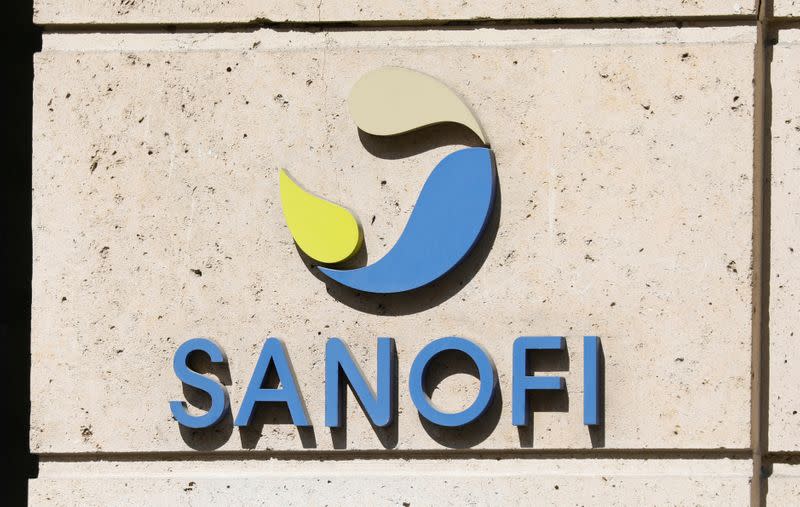Sanofi forges ahead with active ingredients spin-off - sources
By Matthias Blamont, Gwénaëlle Barzic and Arno Schuetze
PARIS/FRANKFURT (Reuters) - Sanofi is starting preparations for a stock market listing of its active ingredients business as the French drugmaker pushes ahead with a strategy focusing on its more profitable businesses, sources told Reuters.
CEO Paul Hudson set out a plan in December to boost profits by 2022 by exiting diabetes and cardiovascular research and slashing costs, and said in February that it would create a separate company for the manufacturing of active pharmaceutical ingredients (API), the essential components of a drug.
Sources said Sanofi could start marketing the API unit to potential individual investors in the autumn while also initiating work on an initial public offering, which could take place in late 2021 if all goes according to plan.
It had said it would decide by 2022 whether to list the separated business on the Euronext Paris stock exchange.
Depending on what Sanofi opts to put into the carved-out unit, the API business could be valued at between 1 and 2 billion euros ($1.15-2.3 billion), the sources said.
France's state investment bank Bpifrance was involved in discussions and was considering taking a stake, according to several sources.
Two sources said other institutional investors, in Germany and at a regional level in France, had also been approached and were involved in discussions.
POLITICALLY SENSITIVE
The process is likely to be sensitive in the context of the coronavirus pandemic. President Emmanuel Macron has pledged several times to diminish the heavy reliance of France on drugs made outside the country.
"Sanofi remains committed to executing our IPO on Euronext Paris as planned. We are not reviewing any other financial alternative option," a group spokesman said in an emailed statement.
Sanofi's adviser Rothschild and Bpifrance declined to comment.
"Separating the API business is extremely complex and will take some time. Sanofi may decide to keep the most profitable parts. Earnings of the standalone API unit will also depend on the supply contracts it would sign with Sanofi," one of the sources said.
Sanofi has said it wants to retain a minority stake in the business and become a customer. The new company would rank as the world's second-biggest API player by sales, behind Switzerland's Lonza, in a $170 billion market otherwise dominated by manufacturers from India and China.
"Shaping the future of the API will be one of the first priorities of the management team after the summer break and everyone is well aware the discussions with the employee representatives will be very challenging," one of the sources said, asking not to be named for confidentiality reasons.
"It is also seen as a test for (CEO) Hudson as he will have to demonstrate his team can mastermind a complex operation in the current context," the source said, adding talks with unions would start in September.
JOBS IN FOCUS
Sanofi has said the new group would be headquartered in France, operate with at least 3,100 skilled employees and have sales estimated at about 1 billion euros by 2022.
The business would be established on the back of six of Sanofi's European API production sites in France, as well as Italy, Germany, Britain and Hungary.
One of the issues would be defining the status and work contracts of the employees at the new entity, the source said, as Sanofi would only retain around 30% of the new business.
The relationship between management and unions is already strained following Sanofi's decision last month to cut up to 1,680 jobs in Europe over the next three years.
Hudson, who took the reins in September, has taken steps to simplify the business, moving it from a generalist pharmaceutical company towards a leaner player centred around vaccines, rare diseases and oncology.
Sanofi is also taking a bold approach to tackling COVID-19, the illness caused by the new coronavirus which has killed more than 590,000 globally, being the sole big pharma group pursuing two vaccine candidates using different technologies.
The company's balance sheet received a $11.7 billion cash boost in May after Sanofi sold most of its 20.6% stake in U.S. group Regeneron. The money is expected to be spent on innovation and acquisitions.
Bankers expect bolt-on deals for biotech companies, similar to its purchase last year of Synthorx, a Californian company focused on therapies for patients with cancer and auto-immune disorders.
A possible sale of Sanofi's consumer health operation is also being considered.
($1 = 0.8744 euros)
(Additional reporting by Pamela Barbaglia; Editing by Elaine Hardcastle)


